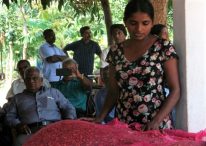WELLAWAYA, SRI LANKA – Chathurika, 35, mother of two, is a peanut farmer from Wellawaya, Sri Lanka. “I was born in a city but now living in this village after my marriage. It was a bit hard to get used to the village life at first but now I consider it a privilege,” she says to introduce herself while her children are joyfully playing on the peanut sacks piled outside her home. “My husband is a retired soldier. He is now assisting me with my farming. Although I successfully completed my advanced level examination, unfortunately, I was not able to get a proper job.”
Chathurika is a member of Uva Wellassa Women Organization (UWWO), a women organization in Handapanagala, Wellawaya operating an agricultural business. UWWO runs a peanut processing center in a dedicated building located at their office premises in Handapanagala. Lanka Farmers’ Forum (LFF) organized a field visit to UWWO to explore their successful agri-business.
“Our livelihood is farming. I have two acres of land where I grow papaya, cowpea, maize, and vegetables. We work really hard but we never got a good income in return because we cannot sell our produce for a good price,” Chathurika continues. “In 2017, I learned about this women organization from a friend. I became a member of this organization and that was the beginning of my growth.”
K. P. Samalatha, president of UWWO explains, “We provide different services to our members to improve their livelihood. We train them on organic agricultural methods, provide micro-loans, leadership training, business training, market coordination, etc. In 2017, with the support of an organization from Japan, we initiated a peanut processing center to help our farmer members get a better price for their peanut harvests.”
“The organization gave us various training on chemical-free agricultural methods which helped us reduce the cost of inputs and increase our income proportionately. I obtained a loan from the organization for a small interest rate and settled a loan that I had taken from a lender on an unbearable interest rate. It was like a rebirth for me. I was overburdened by the compounding interest that I had to pay for that loan,” Chathurika adds. “I invested the rest of the loan to grow peanuts as directed by UWWO. I was able to get an abundant harvest as I followed their training and guidance properly. Usually, farmers sell their peanuts to middlemen, who decide the price, which is always very low. Farmers could hardly cover the production cost by selling to that price. Meanwhile, UWWO purchases our harvest for a better price. Now, I am earning around Rs. 300,000 (USD 1,560) per year from peanut farming.”
UWWO is working with 150 women farmers who grow peanuts in the area. They purchase raw peanuts from the farmers, process, grade, and adds value to the crop. UWWO then sells the processed peanuts to outside buyers. UWWO provides peanut seeds to the farmers, training on best practices, and they also regularly monitor the farmer fields as additional services to the farmers apart from the loan facilities. These diverse services offered by UWWO encouraged its members to stick with the organization which in turn provided sustainability to the organization.
However, as the peanut processing center has registered as a private company, there is no profit-sharing among the member farmers. LFF foresees that if they can register the enterprise as a cooperative society, then the benefits can be shared by both UWWO and its farmer members. #





Comments are closed